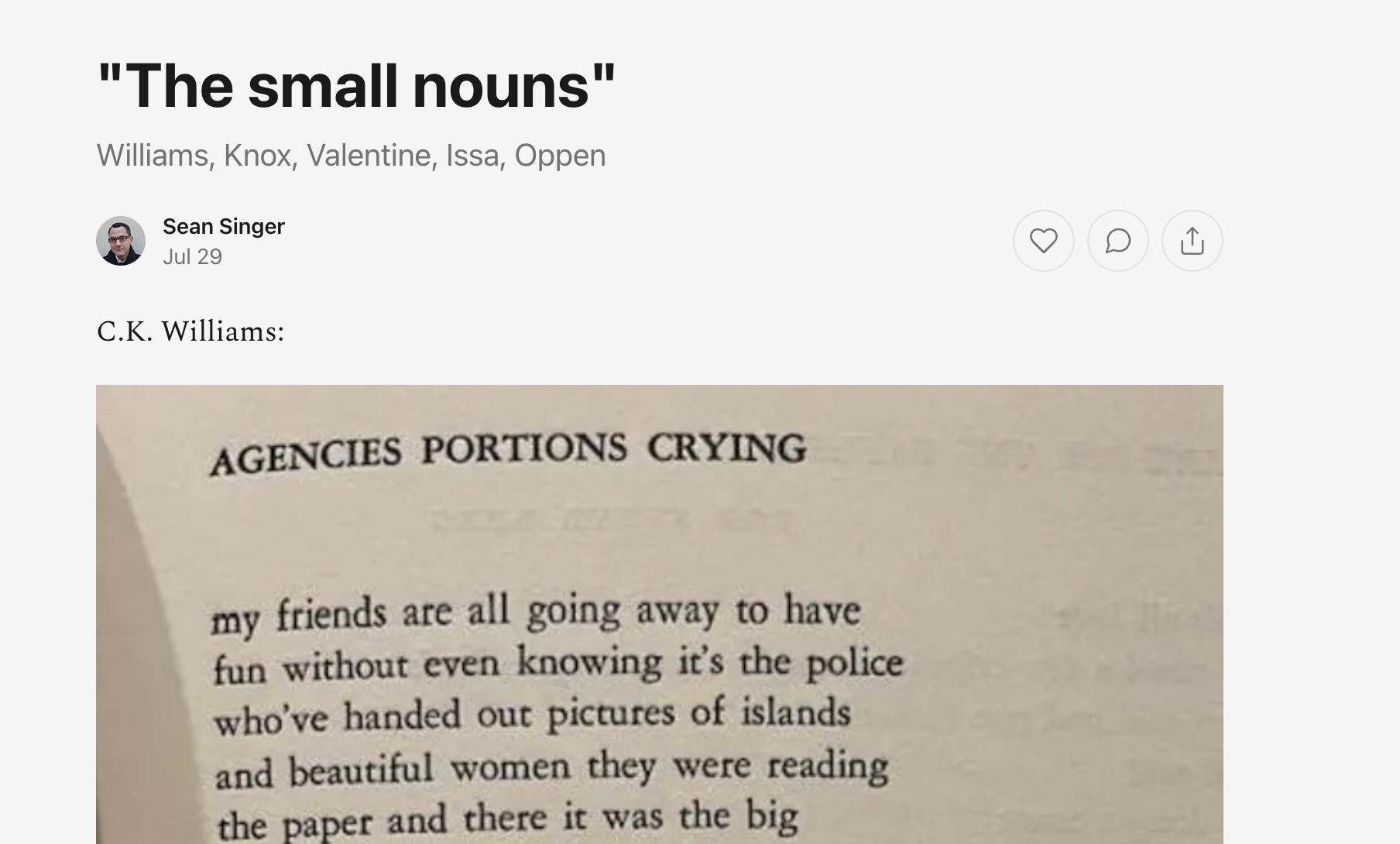Thank you, U.S. Poet Laureate Ada Limón, for including me and Bigfoot in your Poem-a-Day lineup for National Poetry Month. We are so honored to be in this company. <3
I had the pleasure of speaking with Axios Markets reporter Emily Peck about Mushrooms as Villain in The Last of Us! I could've talked her (wood)ear off, of course. The article is here.
Dean Rader, thank you so much for letting me share *The Poem* that revealed the lethal beauty of form to me. I’m honored to be in the company of the poets and poems in your series, "Poems That Changed Me." Click here to check it out.
I'm always honored to be included in Sean Singer's newsletter, "The Sharpener." His super distilled essays on craft are terrific bang for the buck, and the thematic issues in which poems that seem so different show the many faces of a single idea. And what company! Jeez! I’d sign up if I were you.
Ada is one of my dearest friends, so it was a joy to celebrate her new book, THE HURTING KIND, in May 2022 at Prairie Lights. You can watch the whole thing below.
Thank you thank you thank you, Ada Limón, for reading my poem “Facelift” on The Slowdown Show. You know exactly how it should sound! Squee! @CopperCanyonPrs
I’m honored to have a new poem surrounded by striking writing and super cool art by Marcos Guinoza in the new issue of https://thesepia.org/issue-4. Maggie the dog, who appears in the poem, is honored, too.
I’m thrilled to announce that MYCYOWA, a STEAM-themed traveling public art project, has received an American Rescue Plan grant through the Iowa Department of Cultural Affairs. MYCYOWA is an idea that my husband, Collin, and I came up with together when we were walking the dog in nearby Hickory Grove Park.
The goal of MYCYOWA is to increase awareness of mycoremediation, a process in which fungi break down and absorb pollutants on land and in fresh water: heavy metals, textile dyes, tanning chemicals, wastewater, petroleum, hydrocarbons, pesticides and herbicides. If you’re new to the remedial capabilities of mushrooms, check this out: Oyster mushrooms helped clean up after California’s wildfires. Why is it so hard to make a business case for “mycoremediation?” by Renée Alexander, or Mycologist Tradd Cotter’s method for composting old clothes with oyster mushrooms.
Resources will be used to fabricate a set of five compostable, weather-proof bilingual trail signs, to be installed in various locations across the state. Each sign will feature an original poem on the theme of mycoremediation, spoken by the friendly, collective voice of mycelium, similar to a Greek chorus. To echo fungi's surprising vitality across diverse ecosystems, our goal is to install the signs in different landscapes across the state—from urban neighborhoods, local art festivals, and small town main streets to state parks, college campuses, municipal buildings, and hospital systems.
Text on one side of the signs will be in English; text on the other side will be translated into one of the most frequently spoken languages in Iowa: Spanish, German, Chinese (including Mandarin, Cantonese), Serbo-Croatian and Arabic, according to data from the Census Bureau ACS 1-year Estimate for 2019.
Each sign will incorporate a QR code to connect viewers to the MYCYOWA website with information on the project (such as upcoming installations), resources on mycoremediation, and links to social media to foster interaction among viewers and beyond.
American Rescue Plan Grants
In total, 236 individuals and organizations – representing 70 communities across 56 Iowa counties – will benefit from $1,527,814 in one-time grant funding, made possible through the agency’s state/federal partnerships with Arts Midwest, the National Endowment for the Arts and the National Endowment for the Humanities with federal funds through the American Rescue Plan Act.
The department received more than $4.1 million in requests to help support a portion of about 1,600 arts jobs.
The list of grant recipients includes individual artists, cultural centers, museums, local government and community groups, arts organizations, public libraries, historical societies, community theaters, media production organizations and more.
“It’s encouraging to see the return of the arts and culture sector, part of the broader tourism industry working to rebound after a challenging year,” Iowa Department of Cultural Affairs Director Chris Kramer said. “We’re proud to be able to award these grants through our agency’s state/federal partnerships.”
“These recovery grants represent a significant investment in Iowa’s creative workforce,” Iowa Arts Council Administrator David Schmitz said. “In addition to the grants awarded directly to artists, many arts organizations received support to hire or bring back artistic personnel, many of whom lost jobs, gigs and income during the pandemic.”
The faces of the signs will resemble the one above. The anchoring post will be wood. Bases will be weighted but portable with effort, weather-proof, and designed to remain upright on any incline or in wind, like Weebles. Collin, my husband, and his father, Denny, will be fabricating the signs, so…just trust me: they’ll be awesome.






